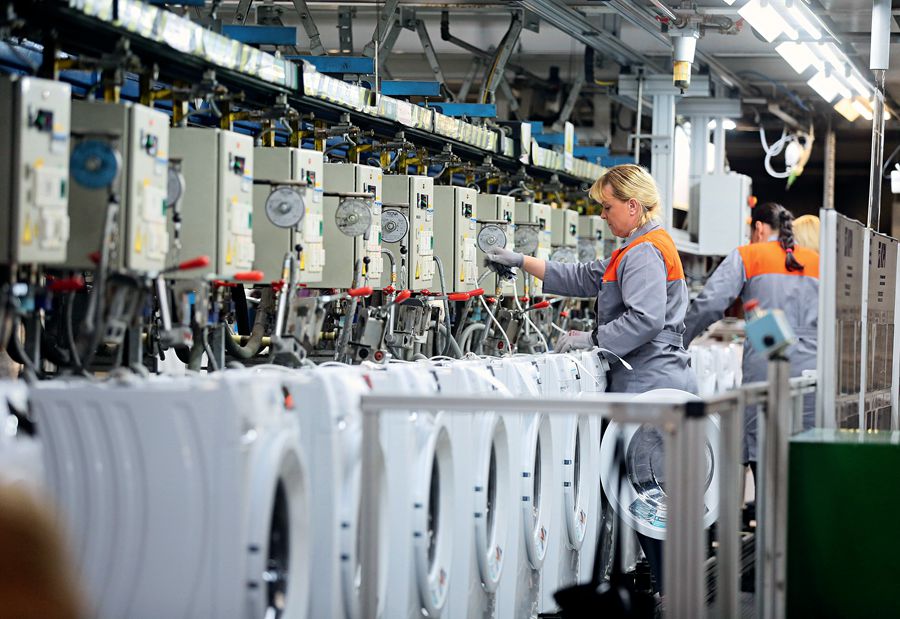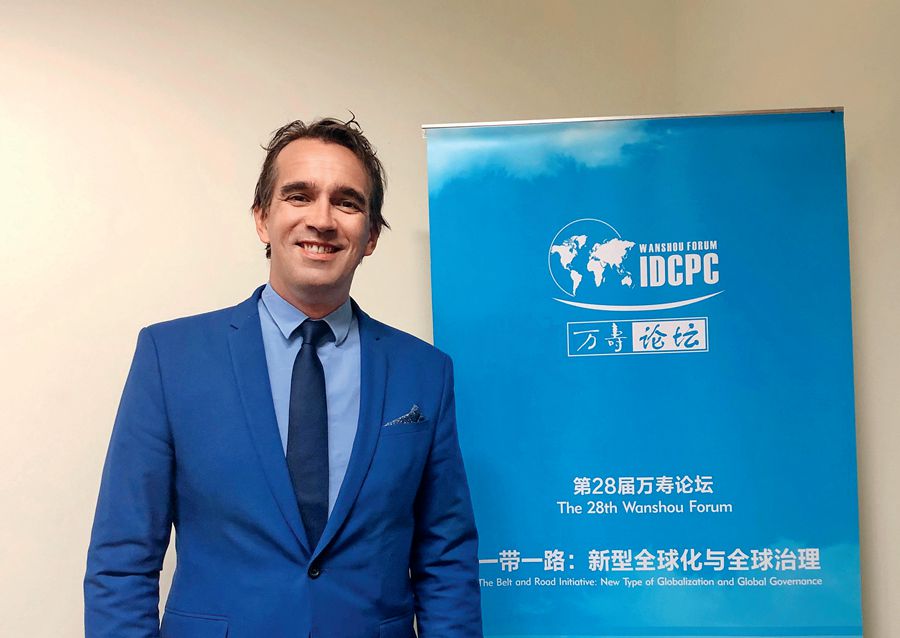FOUR years ago, the publication of a book created a great sensation in Western media. The Silk Roads: A New History of the World written by the Oxford University professor of history Peter Frankopan quickly topped bestseller lists in the English world after its launching.
Realigning People’s Perspective of World History
The book is a reassessment of world history by exploring the forces that have shaped civilizations and driven the rise and fall of empires along the ancient Silk Road. “One of Mr. Frankopan’s gifts as a storyteller is his ability to draw unusual connections across his vast canvas... Frankopan has written a rare book that makes you question your assumptions about the world,” The Wall Street Journal stated.
Just as Frankopan pointed out in the book’s preface, the political, cultural, and moral triumph of the West dominated his textbooks when he was a teenager. “But this account was flawed; there were alternative ways of looking at history — ones that did not involve looking at the past from the perspective of the winners of recent history,” he wrote.

Gorenje is one of the leading European home appliance manufacturers, located in Velenje, Slovenia. China’s Hisense Group has taken full control of the company after purchasing its shares last year.
Undoubtedly, the book offers readers a new perspective to looking at history. The rise of China in the world and its initiation of the Belt and Road Initiative (BRI) that has revived the ancient Silk Road have played a role in the popularity of the book. After being published in Chinese in 2016, the book was rated as one of the top 10 bestsellers of the year by many Chinese media outlets.
In an interview with China Today, Frankopan said, “As a historian, my research into the past is all about asking questions about connections made between peoples, cultures, regions, and geographies – and seeing what we can learn from them. Writing about history from the perspective of the Silk Road is a way of showing that there are different ways of looking at the past – and viewing the world – to the norms that are often adopted.” He continued, “I was keen to show that there are sometimes inter-continental and even global consequences to events that occur in one place and sometimes trigger an impact on the other side of the world, of which we are often not aware.”
Frankopan has been interested in the study of the Silk Road. “Studying the Silk Road of the past also makes clear how commodities, goods, supply and demand, geography, and climate are closely intertwined. That is why I think learning about history does not just help inform us about what happened in previous centuries; it also prepares us to deal with the present and future as well,” he told China Today.
Modern Extension of the Ancient Silk Road
Today the Belt and Road, a modern extension of the ancient Silk Road, is having an increasing influence on the global stage as a slew of BRI projects spring up across the globe which improve global infrastructure and connectivity. Frankopan, a historian fascinated with the ancient Silk Road, also shared his view about its modern version with China Today.
“The Belt and Road Initiative aims to increase connectivity in Asia, in Africa, and in Europe. And it’s very important that countries work together,” Frankopan said. He further pointed out that there is a huge demand for infrastructure improvement in Asia as well as globally, which will surely facilitate increased trade and fuel development. However, given the enormous investment involved, many countries don’t have the capacity to undertake this alone. “So China’s investments in railways, roads, ports, and other facilities in parts of the world can be very beneficial. And of course, China has accumulated a great deal of experience in building such large-scale infrastructure projects in the past 40-year development.”

Oxford University professor of history Peter Frankopan attends the 28th Wanshou Forum with the theme “The Belt and Road Initiative: New Type of Globalization and Global Governance” in Beijing in late April, 2019.
He further elaborated, “I think improving connections through trade, cultural exchange, and sharing of knowledge and experience makes the world more prosperous. I believe that cooperation enables a rise in mutual prosperity and usually provides conditions that help us with basic issues like cultural understanding and tolerance.”
At the opening ceremony of the Second Belt and Road Forum for International Cooperation held on April 26, President Xi Jinping stressed in his keynote speech that China would pursue open, green, and clean cooperation in the joint pursuit of the BRI. “We may launch green infrastructure projects, make green investment, and provide green financing to protect the Earth which we all call home. In pursuing Belt and Road cooperation, everything should be done in a transparent way, and we should have zero tolerance for corruption. The Beijing Initiative for Clean Silk Road has been launched, which represents our strong commitment to transparency and clean governance in pursuing Belt and Road cooperation,” Xi stated. In the speech President Xi also emphasized the importance for the vision of sustainable development which underpins project selection, implementation, and management in the joint construction of the Belt and Road.
Frankopan was impressed by Xi’s emphasis on environmental sustainability and a clean Belt and Road. “The focus on green initiatives, on mitigating climate change, and working out the long-term implications of large projects is not just important but essential. That’s partly because many of the projects evolved in infrastructure are dirty. They involve power, they involve roads, they cause environmental pollution. In a world undergoing climate change it’s important that China plays a leading global role in explaining the dangers and trying to prepare for and mitigate these risks,” he said.
New Political Landscape, New Global Governance
The past several decades have seen the rise of the East. The voice that the East is taking center stage is frequently heard. As the blurb of Frankopan’s book states, for centuries, fame and fortune were to be found in the West… Today, it is the East which calls out to those in search of riches and adventure.
“In today’s world, China has a much louder voice and much greater capability to be playing a role both regionally and globally. Today we’re all watching how China views these changes and what it thinks is the most important,” Frankopan told China Today.
Frankpan thinks China’s investment in European countries’ infrastructure is very positive and boosts local development.
“Right now in Europe, many people are very concerned about the changing world. They feel very insecure about a world where Western Europe is not in the lead anymore,” he acknowledged.
He further explained, “The world has changed a great deal. Twenty or 30 years ago, it would not have been Chinese investors who were looking at supporting projects in Europe – such as road-building, port expansion and rail lines. And so we have to learn in the U.K. and in Europe what our role is in this new global governance. We have to learn what we are comfortable with and in some cases where we have choices.”
Regarding the apprehension to Chinese investment held by some Western Europeans, Frankopan said, “My view is that if there is no investment from China, then in some cases, it is possible that there will be no investment at all. So we have to learn how to work together.”
About the changing world economic and political landscapes, Frankopan commented, “These are challenging times for all of us in the world today. It seems to me that many countries face difficult decisions about what their futures involve and what choices they are able to make. Part of the problem comes from education and the limitations of the ways we understand each other, and how we try to assess each other’s motivations. This both explains some of the current problems, and also provides a way to work towards better compromises all round.”
Frankopan admitted that there are some problems flawing the existing global governance system, which, he thought, has run pretty good on the whole since World War Two. “There have been benefits, even in an imperfect system, which have redistributed global wealth. So in the last 30 years, countries like Indonesia, Turkey, India, China, and Mexico have benefited very well from the system. But that has produced major changes in the locations of labor forces, of supply chains, and of economic growth. The question we face today is how do we try to have a new globalization to make that work? What is the correct response when some feel that there is not a level playing field? And how do we find a way through differences of opinion that threaten to de-stabilize the global economy?”
He noted that one major feature of the global governance in this new era is China’s bigger role. “China is much more engaged globally than it was 30 or 40 years ago. China is much more influential, and has more opportunities to help shape governance. And the China-proposed BRI has started to work on a practical level. I think from outside China, understanding what the best outcomes are for individual projects locally and for China is important; so is assessing how China measures the success of projects and BRI as a whole; seeing how BRI adapts and evolves is also vital. But the main point is who really gets the benefits?”
These are very open questions, and in some cases there are obviously no clear answers. “But these are the questions that need to be asked all the time. There’s no right answer about them because the world is changing as well,” he said.

